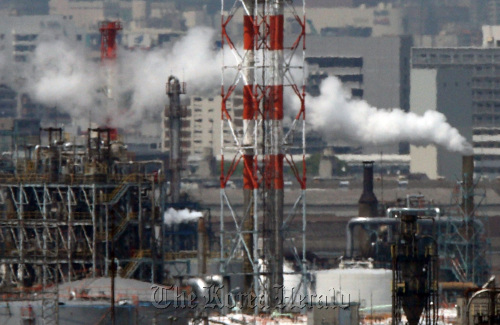Japan’s industrial production increased the most in 11 months in December, boosted by overseas demand that’s spurring the nation’s recovery.
Factory output climbed 3.1 percent from November, when it rose 1 percent, the Trade Ministry said in Tokyo Monday. The median estimate of 29 economists surveyed by Bloomberg News was for a 2.8 percent gain.
Honda Motor Co. and Nissan Motor Co. are among companies increasing production to meet demand from China and the U.S., Japan’s largest export markets. Benchmark 10-year Japanese government bond yields have risen about 10 basis points this year amid expectations of a domestic economic recovery.
“The Japanese economy is returning to an expansionary path buoyed by foreign demand, a typical way for Japan to recover,” said Hiroaki Muto, a senior economist at Sumitomo Mitsui Asset Management Co. in Tokyo. “With today’s production data and last week’s robust export increase, we can be pretty sure that the economy will escape from its lull in the current quarter.”
 |
Steam rises from smokestacks at a factory in Kawasaki City, Kanagawa Prefecture, Japan. (Bloomberg) |
The yen traded at 82.11 per dollar at 10:10 a.m. in Tokyo from 82.17 before the report was published. The Nikkei 225 Stock Average fell 1.6 percent.
Japan’s economic growth will accelerate in each quarter this year, after shrinking in the three months through December due to the expiration of government subsidies to encourage consumer spending, according to a survey of economists by Bloomberg News.
The economy contracted at a 0.75 percent annual pace last quarter, a median estimate of 14 economists surveyed by Bloomberg shows.
Supporting growth in Japan is demand from the U.S. and China, the destination of more than a fifth of Japanese shipments.
Chinese imports soared 39 percent last year, with the monthly value reaching a record $141 billion in December. The country’s retail sales rose 18 percent in 2010.
The U.S. economy grew at a 3.2 percent annual rate in the fourth quarter of 2010 as consumer spending climbed by the most in more than four years, a Commerce Department report showed last week.
Automakers are raising output to meet overseas demand. Nissan Motor, Japan’s third-biggest carmaker, said last week global production rose 19.8 percent in December from a year ago. Honda Motor, the country’s second-largest automaker, said global output of its cars and light trucks gained 0.3 percent.
Panasonic Corp. may double its production capacity for light bulbs using light-emitting diodes within two years to tap the growing market for energy-saving devices, Yoshio Ito, president of Panasonic’s lighting business, said last week.
Manufacturers said they plan to increase output 5.7 percent in January then decrease output 1.2 percent in February, a government survey included in Monday’s output report showed.
Japanese economic data released Jan. 28 showed that deflation eased in December and the unemployment rate declined to 4.9 percent from 5.1 percent. Consumer prices excluding fresh food declined 0.4 percent from a year earlier, the statistics bureau said, the smallest drop since 2009.
Posing a risk to the country’s export-led recovery is the strength of the yen, which has gained 8.8 percent against the dollar in the past year. A higher yen rate tends to weigh on companies’ overseas income.
A 3.3 percent decline in household spending in December also underscores the weakness of domestic demand.
Employment situation
“The Japanese economy is at a standstill,” said Akiyoshi Takumori, chief economist at Sumitomo Mitsui Asset Management Co. in Tokyo. “It will take time until the employment situation improves significantly when deflation is continuing.”
Meanwhile, investor concern is growing about the country’s increasing debt, projected to reach 210 percent of gross domestic product in 2012, according to the Organization for Economic Cooperation and Development.
Standard & Poor’s last week cut Japan’s credit rating to AA-, fourth-highest level, saying it expects the country’s government debt ratios to continue to rise.
Prime Minister Naoto Kan has called for a national debate on increasing the 5 percent sales tax rate to boost the government’s revenue. He’s also striving to win passage of spending bills for a record 92.4 trillion yen ($1.1 trillion) annual budget through the opposition-controlled upper house, after a regular parliament session started last week.
(Bloomberg)








